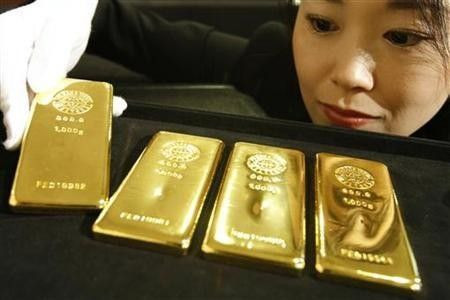Why Are Emerging-Market Central Banks Stocking Up On Gold?

Central banks in emerging markets continue to gobble up gold due to concerns about fiat currencies, such as the U.S. dollar and especially the euro. Analysts expect the trend to remain intact for a while, which could drive gold prices higher in coming months.
I wouldn't be surprised that a year from now, we would see gold at $2,500 [a troy ounce], said James DiGeorgia, publisher and editor of the Gold and Energy Advisor.
The most actively traded gold contract, for June delivery, gained $11.40, or 0.7 percent, to settle at $1,568.90 a troy ounce Friday. Even with Friday's gain, however, gold futures were still down 1.4 percent on the week.
ALSO READ: Will US Job Growth Disappoint In May For 3rd Straight Month?
According to April trade data from the International Monetary Fund, central banks in emerging markets continued to be buyers of bullion this year as they seek to diversify their assets.
The decline in the price of gold this year may have contributed to their interest in the precious metal, as its price per troy ounce fell from a 2012 high of $1,785 at the end of February to $1,650 in April.
With gold prices in May at even lower levels than in April, additional EM central bank buying may be possible given the declines, HSBC analyst James Steel said in a May 24 note.
Central banks in emerging markets collectively bought 36 metric tons of gold in April, making it the second consecutive month their purchase of gold were measured in double-digit metric tons: They snapped up 81.2 metric tons in March.
Turkey was the biggest buyer in April, expanding its gold reserves by 29.7 metric tons, or 14 percent, to 239.3 metric tons.
The Philippines boosted its gold holdings by 32.13 metric tons -- to 194.24 metric tons in March -- a 17 percent hike and the single largest increase the Philippines has recorded since September 2008.
Also in the IMF's report for April are the following tidbits:
-- Mexico boosted gold holdings by 2.92 metric tons, to 125.50 metric tons.
-- Kazakhstan increased gold holdings by 2.02 metric tons, to 98.19 metric tons.
-- Ukraine raised gold reserves by 1.40 metric tons, to 30.61 metric tons.
-- Sri Lanka upped gold reserves by 2.18 metric tons to 7.81 metric tons in January. (There is a delay in Sri Lankan gold reserve reporting to the IMF.)
Although price is a contributing factor, it's not a determining one.
Relative to the danger of storing their wealth in [the] euro or the dollar, it's clearly a bargain to put their wealth into gold, DiGeorgia said. There's a general fear out there, especially with the Greek election and the dangers that a bank run in Greece might spread to Italy or Spain ... thereby bringing down the euro.
In a fiat-money system, in which the currency is not backed by a commodity, the only thing that gives money value is its relative scarcity and the faith placed in it by the people who use it.
The European Union's recent summit failed to shed new light on its handling of the debt crisis, pushing Greece a step closer to exiting the single-currency bloc and leading to safe-haven buying.
Meanwhile, the crisis is being compounded by the increasing insolvency of Spanish banks, as well as Spain itself.
Spain's nationalized lender Bankia SA asked the Spanish government for €19 billion ($23.8 billion) in financial support Friday.
The request came on the same day credit rating agency Standard & Poor's downgraded Bankia and four other Spanish banks to junk status due to uncertainty over restructuring and recapitalization plans.
If you are a central banker for an emerging nation, the last thing you are going to want to do is hold tremendous amount of euros, DiGeorgia said. In the long term, countries that hold gold seem to be much more stable.
Investors who wish to gain exposure to the potential upside in gold prices can purchase gold-linked exchange-traded funds such as the SPDR Gold Trust (ETF) (NYSEARCA: GLD), iShares Gold Trust (NYSE: IAU), Market Vectors Gold Miners ETF (NYSE: GDX), or Market Vectors Junior Gold Miners ETF (NYSE:GDXJ). The former two investment vehicles are tied to the market price of gold, while the latter two of them are tied to the market prices of gold-mining companies.
Another way is to buy the currencies of gold-producing countries, like Australia, or China, or South Africa, or Canada, said Chuck Butler, president of EverBank World Markets. They will benefit in value from higher-priced gold.
© Copyright IBTimes 2024. All rights reserved.





















